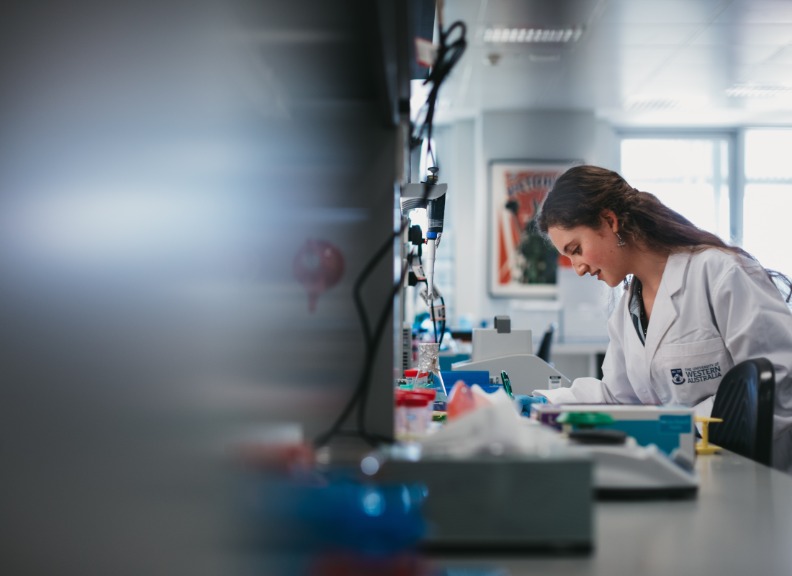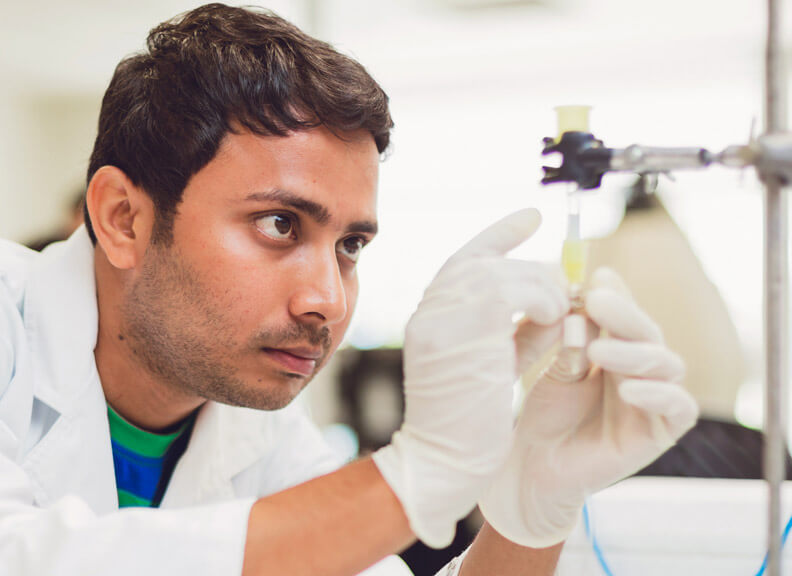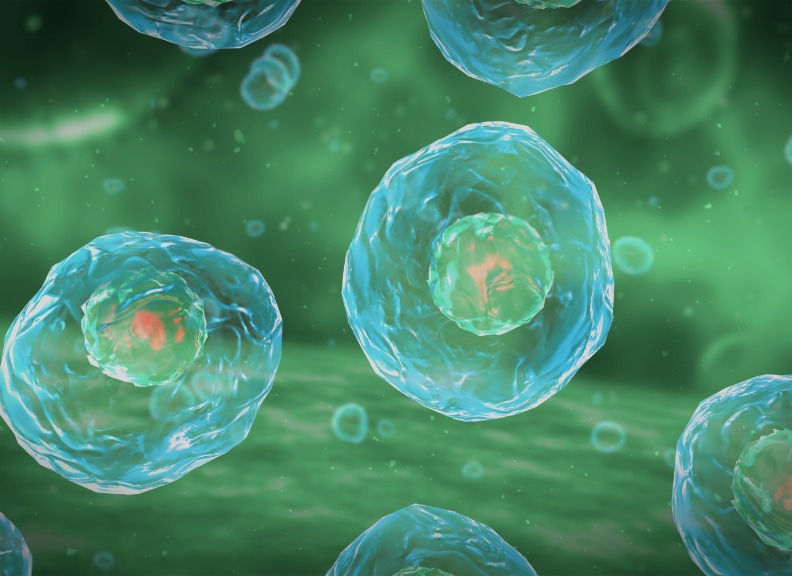Undergraduate
Bachelor of Molecular Sciences
Solve life’s greatest challenges through cutting edge approaches in molecular sciences
Majors available

Bachelor of Molecular Sciences and Master of Bioinformatics
Develop biological and analytical knowledge and skills in the area of genomics and other 'omic' data to inform basic human science questions relating to health, disease, agriculture and our changing environment.

Bachelor of Molecular Sciences and Master of Biomedical Science
Do you love science and food? Are you interested in the role of nutrition in saving lives, reducing morbidity, and improving health?

Bachelor of Molecular Sciences and Master of Biotechnology
Gain the skills needed with the Combined Bachelor and Master in Biotechnology to solve life’s greatest challenges through cutting edge approaches in medical, environmental and agricultural advances.

Biochemistry of Nutrition (Extended Major)
Are you interested in how nutrition saves lives, reduces morbidity and improves health? This extended major will prepare you for a career as a nutritional consultant, food technologist, dietician, biochemist or healthcare professional.

Molecular Life Sciences (Extended Major)
This extended major will help you develop in-depth understanding in biochemistry, genetics, and molecular biology, preparing you for a career in fields such as biotechnology, health diagnostics, aquaculture and plant breeding.
The learning experience
Barry J Marshall Library
This library is UWA's hub for science students and researchers. Named after the University's Nobel Prize-winning professor, it has soundproofed study rooms, multimedia suites and a café on site.
Centre for Microscopy, Characterisation and Analysis
Through the Centre for Microscopy, Characterisation and Analysis, UWA enables research excellence by providing world-class microscopy and microanalysis facilities, including our unique pair of ion probes, the IMS 1280 and NanoSIMS 50, which offer world-exclusive analytical capabilities to Australian and international researchers.
Why choose UWA
Explore our campuses and facilities, get to know the history of our State’s oldest university and discover why a UWA degree can set you up for the careers of the future, not just the jobs of tomorrow.
Why choose UWA
Student Life
Discover what life’s really like at university, hear from current students in a variety of courses and learn about the student amenities and support services on offer at UWA.
Events
One of the best ways to find out about studying at UWA is to take part in the many events we offer future students.
Fees and scholarships
Domestic Student Fees
For Commonwealth-supported places, student contribution amounts are charged by unit, based on area of study. For a fee estimate, go to the Fee Calculator and select “I want to price my units”. Fees are subject to annual indexation. Refer to the Handbook to identify the units required. More information on how fees are calculated.
Scholarships
Scholarships are available to students from a diverse range of backgrounds, including academic achievement, financial need, educational disadvantage, leadership and community service, artistic or sporting achievements, and being from a rural or remote area.
International Student Fees
Onshore international students are charged an annual course fee, charged per credit point at a rate dependent on the course in which the student is enrolled. Annual course fees are calculated based on an annual study load. Check the handbook to confirm the annual study load for your course.
Find out more about international student tuition fees and visit the fee calculator for the relevant course fees.
Fees are subject to annual indexation.
Scholarships
Scholarships are available to students from a diverse range of backgrounds, including academic achievement, financial need, educational disadvantage, leadership and community service, artistic or sporting achievements, and being from a rural or remote area.
Careers and further study
Career Opportunities
Upon successful completion of the Bachelor in Molecular Sciences, you can pursue further career development by completing an honours or master’s degree, which opens the opportunity to expand your career at PhD level and beyond and become a highly qualified scientist.
You can follow a career pathway as a research scientist in industry or academia (animal, plant or microbiological biochemistry, biotechnology, molecular biology, genetics and genomics).
You may have the opportunity to follow a career as a research scientist or consultant in the health science and service industry, or food industry.
You can develop your career to become a teacher or lecturer in secondary and tertiary education
Graduates may work as:
- Agricultural consultant
- Agricultural scientist
- Animal scientist
- Biochemist
- Biomedical scientist
- Biotechnologist
- Environmental scientist
- Food technologist
- Forensic scientist
- Geneticist
- Health and welfare service manager
- Health promotion officer
- Laboratory manager
- Nutritional scientist
- Pharmacist
- Policy and planning manager
- Research officer
- Secondary school teacher
- University lecturer
Further study
Entry requirements
Admission Requirements
To be considered for this course you need to:
- Achieve the University’s minimum entry score
- Demonstrate English language competence
- Satisfy any prerequisites for your preferred majors (refer to individual major descriptions for prerequisite details)
You can view the prerequisites and recommended subjects for your chosen course here.
View our admission requirements for specific information, depending on your education history.
Assured Pathway information
If you have a professional career in mind, take advantage of one of our Assured Pathways. An Assured Pathway gives you an assured place in one of our postgraduate professional courses (such as Law, Engineering or Medicine) from the start of your studies with us. The pathways combine a range of undergraduate and postgraduate courses, providing you with a clearer direction to your career of choice.Admission entry to UWA
We offer a number of other pathways for you to gain entry into our undergraduate degrees if you do not meet the standard admission requirements. Learn more about our admission entry pathways.
About the Bachelor of Molecular Sciences
Understand life at the molecular level - the complex functioning of cells, tissues and organisms. Training in cutting-edge technologies will equip you with the tools to tackle the many challenges in the biological and/or health sciences. This degree also serves as an excellent stepping stone into careers in the biosciences.
QUICK DETAILS
- Available
- 80
- Semester 1, Semester 2
- 3 years full time
- BP028
- 107482K
- Specialised Bachelor's Degree
- UWA (Crawley campus)
About the course
In Molecular Sciences you will learn about life at the molecular level. Starting with the building blocks of life (DNA, RNA, proteins, lipids and carbohydrates) you work towards understanding the complex function of cells, tissues and organisms. Training in cutting-edge technologies will equip you with the tools to answer the many challenges in the biological and/or health sciences.
Why study Bachelor of Molecular Sciences at UWA?
- Learn from leading researchers in the field of molecular sciences about the most recent advances in the molecular life sciences, how these affect our everyday lives and how we can use this knowledge to solve global challenges
- This degree at UWA is the ultimate multi- and interdisciplinary learning experience, bringing together knowledge and practical skills from multiple molecular sciences disciplines to account for the rapid growth of this field in research, service and education
- The specific molecular sciences skills and knowledge, as well as work skills developed and demonstrated by graduates, such as teamwork, critical evaluation and use of data, planning and time management, and communication in written and oral form, are highly valued by employers and will make you very competitive in the job market
Work Integrated Learning
Work Integrated Learning (WIL) helps bridge the gap between theory and practice by providing opportunities for students to gain hands-on, practical industry relevant experience and for employers to help shape the graduates of tomorrow.
Cell and Molecular Life

The Cell and Molecular Life Facility offers state-of-the-art technology to staff and students whose research investigates diverse insults affecting animal and human cells and tissues.
Bayliss Building

Cutting-edge facilities enable world-class research and study

